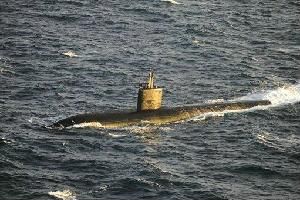
New Delhi, October 26: If an Indian submarine gets "disabled" deep underwater, the sailors are sunk since the country has only rudimentary submarine rescue facilities. Now, in a unique and complex endeavour, Indian and US Navies have come together to practise the rescue of "trapped" submariners from deep under the sea.
The Indo-US submarine rescue exercise 'INDIAEX-2012' kicked off this week with the US Navy's Undersea Rescue Command flying down a submarine rescue system - a deep-submergence rescue vessel (DSRV) or a submarine rescue chamber (SRC) — to Mumbai, say officials.
The DSRV or SRC is being shipped to the exercise area off Mumbai, where it will dive deep underwater to "mate'' with "disabled'' submarines to rescue sailors in intricate manoeuvres rarely practised by Indian sailors.
A DSRV or "mini submarine", equipped with pressurised chambers, sonars and cameras, can rescue 24 sailors at a time from a depth up to 610 metre after "mating" with a stricken vessel's hatch.
At present, Indian sailors only bank upon "submarine escape pressurized suits'', or the help of diving support ships like INS Nireekshak, but they can be used only for relatively shallow depths.
Navy's endeavour to procure two DSRVs of its own, for just about Rs 1,000 crore, has been stuck in the doldrums for well over a decade now. As "an interim measure" in 1997, India had inked the contract with US Navy for its "global submarine rescue fly-away kit'' service, paying an initial $734,443 for it.
But the agreement also got derailed due to the post-Pokhran-II sanctions in 1998. It was later revived in 2004, but there has been a huge delay in setting up the requisite infrastructure needed for it.
This also included fitting of "Padeyes'' — holding devices welded into submarine escape hatches to secure the DSRV — on Indian submarines. The US rescue system will be transported to India within 72 hours of an emergency.
Proper submarine rescue facilities are critical for India since it has an ageing fleet of 14 diesel-electric submarines — 10 Russian `Kilo' class and four German HDW ones — apart from the nuclear-powered INS Chakra leased from Russia earlier this year. There are also six French Scorpene submarines, being constructed at Mazagon Docks under the Rs 23,562 crore 'Project-75', slated for delivery in 2015-2020, three years behind schedule.





Comments
Add new comment